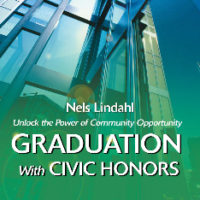When working to strengthen the community, anything is possible, and any time alternatives are not considered, potential is lost.
Imagine a world where everyone who wanted to volunteer some of their time had one place they could go to find out how to participate. Understanding what is possible requires recognizing that individuals are all different and that bringing together all of their individual strengths, capacity, and skill specializations will benefit the community (Gulick & Urwick, 1937). Imagine, if you will, a world where no gap exists between the individual who wants to benefit society and the organizations that desperately need additional help from volunteers. Imagine a world full of accessible information provided by universities and other organizations engaged in graduation with civic honors. This is possible with the right amount of time and effort. It is an idea that quickly can become reality with the right motivation and intentions. It is possible to motivate individuals by focusing on individual civic attitudes and participation within the community (Barber, 1984). It is also very important to start designing the graduation with civic honors program with this end in mind. One of the first steps is to identify how the program can realize the vision of what is possible (Covey, 1989).
This vision of what is possible includes all of the individuals within the community. All of these individuals can gain from realization of the vision of the university. This vision should allow the community to organize in a way that capitalizes upon both what is possible and what already exists within the community. The vision involves recognizing and leveraging the strengths of individuals to serve the needs of the community. Thinking about what is possible for the individual within a given community is essential to connecting the worlds of possibility and potential accomplishment. Some skepticism exists about whether or not it is possible to change civil society by developing programs to respond to practical problems within society (Dionne, 1998). The questions result from the assumption that strengthening civil society is such a noble idea that programs do not receive an appropriate level of scrutiny. Any reservations about the graduation with civic honors program should and will receive attention within the following pages.
What occurs within this vision is a program that, over time, recruits a body of individuals to participate within the community. It is important to identify an extensive pool of individuals within the university. Many individuals have the potential to make a difference in the community. The university can bridge with organizations within the community to create seamless access for individuals interested in volunteering. Moreover, this program creates a powerful dynamic between the community’s needs and the university, which fits the mission of most universities. Within the current civil society, this power dynamic already may exist within some organizations. To create an environment conducive to change, the entire community does not have to be willing to participate in the civic honors program, but the entire community should know that the program exists. It may take some bold and strong organizations that are willing to start graduation with civic honors programs to get the ball rolling. Each person graduating with civic honors has the potential to be a community leader who can provide not only vision but also long-term stewardship of the ideas behind the introduction of a civic honors program.
This charge is important to the community overall because it opens the door for not only leadership but also realistic change within the community. Many students are already volunteering in the community, perhaps through a service learning program on campus or as part of a church, synagogue, or club initiative. The civic honors program relies on a partnership to get people involved and to allow organizations to communicate their needs to the community. The charge specifically is to foster the development of community by making it easier for individuals to participate within the community, while creating visible recognition at graduation for those who worked for the community as well as for themselves. This simple idea is the backbone of mobilizing thinking of the community as a network of individuals with infinite potential that can strengthen the community. A university can become a strategic partner with the community, willing to facilitate communication between individuals and organizations from the perspective that anything is possible.
Transforming the vision of a civic honors program into a reality involves a considerable amount of leadership and innovation. The university may view the creation of a civic honors program also from the perspective that it is a bridge to enhance connection between the university and the community by enabling individual action to strengthen the community. Understanding what is possible through the civic honors program involves being able to see the new levels of potential broader community impact. A graduation with civic honors program endeavors to unlock a world of potential that transcends the walls of the university and strengthens the social fabric of the community.
